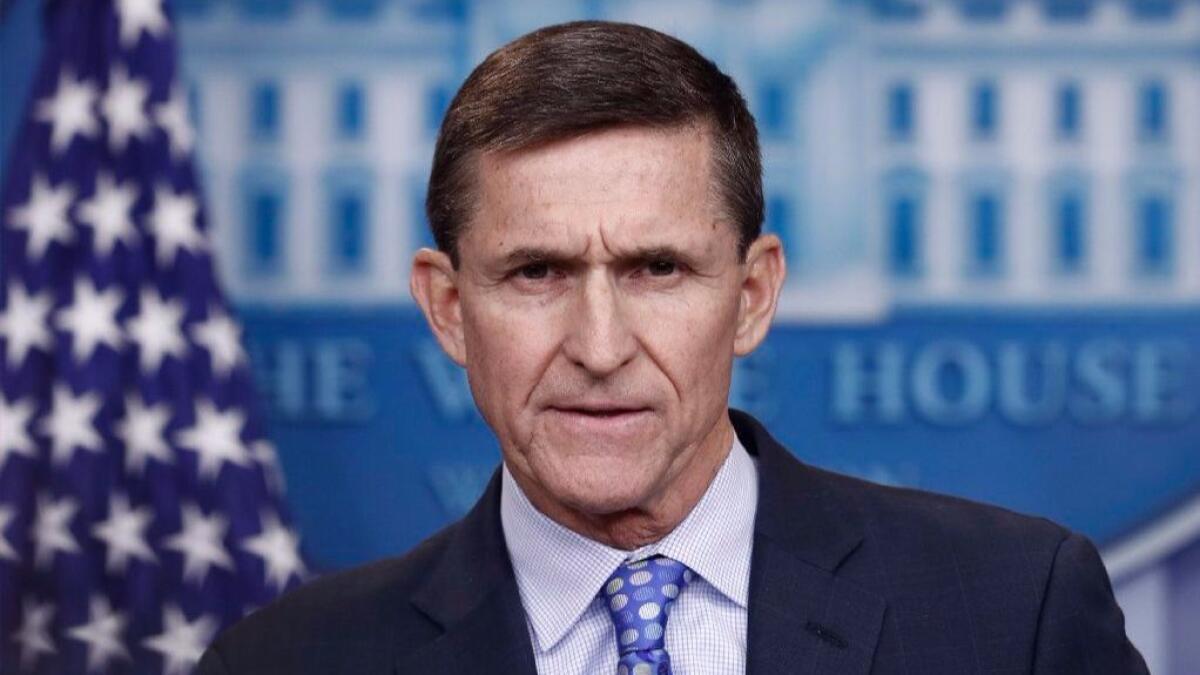Michael Flynn and Trump’s personal lawyer among seven subpoenaed in Russia investigation

Reporting from Washington — The House Intelligence Committee issued seven subpoenas Wednesday, ramping up its investigations into Russian interference in the 2016 election and into whether names of President Trump’s associates were improperly revealed in classified intelligence reports.
Subpoenas went to Trump’s former national security advisor, Michael Flynn, and to the president’s longtime personal attorney, Michael Cohen. The Senate Intelligence Committee and a federal grand jury in Virginia also have issued subpoenas for Flynn’s business records.
In a statement, the House committee said it had issued subpoenas seeking “testimony, personal documents and business records” from Flynn and Cohen. It also approved subpoenas for the Flynn Intel Group LLC and for Michael D. Cohen & Associates PC.
“We hope and expect that anyone called to testify or provide documents will comply with that request, so that we may gain all the information within the scope of our investigation. We will continue to pursue this investigation wherever the facts may lead,” Rep. K. Michael Conaway (R-Texas), the committee chairman, and Rep. Adam B. Schiff (D-Burbank), the ranking member, said in a statement.
The investigative moves come as Robert S. Mueller III, the special counsel investigating possible links between the Trump campaign and Russia, has cleared ousted FBI Director James B. Comey to testify before the Senate Intelligence Committee about his contacts with the president, according to a Comey associate.
No hearing date was set for Comey’s testimony, which is likely to focus on reports that Comey filed an internal memo in mid-February saying that Trump had asked him to ease up the FBI investigation of Flynn.
Trump abruptly fired Comey as head of the FBI on May 9. The president later said in an interview on NBC News that he was concerned about the FBI investigation into what he called the “Russia thing.”
Comey’s memo, and the president’s statements, have sparked concern that Trump was seeking to block the widening FBI investigation into Trump’s top aides, including at least one still at the White House. Trump has denied any wrongdoing.
The latest subpoenas sparked new partisan wrangling on the House panel, with aides to Democratic lawmakers complaining that the chairman, Rep. Devin Nunes (R-Tulare), had approved three subpoenas without their knowledge.
The three subpoenas — to the CIA, the FBI and the National Security Agency — suggested Nunes was moving independently of the panel’s main investigation into Russian meddling and focusing instead on an issue that the White House preferred.
The three agencies were asked to provide records of any requests to “unmask,” or reveal, names of Trump’s associates by President Obama’s former national security advisor, Susan Rice, former CIA Director John Brennan and former U.S. Ambassador to the United Nations Samantha Power, according to an aide familiar with the requests.
Nunes came under intense criticism in March when he told a hastily called news conference that an unidentified source had told him of “dozens” of intelligence reports from court-authorized surveillance that included the names of Trump transition team members. He said he was going immediately to the White House to brief Trump on the information.
Nunes subsequently admitted he had received the information in the White House complex, explaining it was the only safe place to examine the classified material. He stepped down from the Russia investigation in April after the House Ethics Committee said it had opened an inquiry into whether he had improperly disclosed classified information.
In most cases, the identities of U.S. citizens picked up in such surveillance are supposed to be kept confidential in intelligence reports. But authorized U.S. officials can request that the names be revealed to them — a process known as “unmasking” — if knowing the name is necessary to understand the intelligence.
Flynn, a retired Army three-star general, was forced to resign in February as Trump’s top national security aide after news stories revealed the existence of a transcript of Flynn’s conversations with Russian Ambassador Sergey Kislyak.
The diplomat’s calls were recorded as part of routine U.S. intelligence monitoring of ranking foreign officials, and the Justice Department warned the White House that Flynn could be blackmailed for his statements about those contacts.
Cohen has acknowledged meeting in January with Felix Sater, a Manhattan real estate developer who worked on several projects with Trump, and a Ukrainian lawmaker who asked them to bring the White House a pro-Russian peace deal for Ukraine.
Cohen was quoted in the New York Times in February saying he gave the envelope containing the proposal to Flynn, but Cohen later denied delivering it to the White House.
In a separate development, a senior Justice Department lawyer and FBI veteran with experience in complex financial fraud investigations has agreed to join the special counsel’s investigation.
Andrew Weissman has led the fraud section at the Justice Department, where he oversaw investigations into corporate wrongdoing at Volkswagen and Takata. He is the highest-ranking Justice Department official to join Mueller’s team.
Twitter: @davidcloudLAT
MORE FROM POLITICS
In President Trump’s wake, divisions mark both Democratic and Republican parties
All jokes aside, Trump’s ‘covfefe’ tweet sparks questions too
Trump is poised to withdraw from Paris climate pact — unless he changes his mind
More to Read
Sign up for Essential California
The most important California stories and recommendations in your inbox every morning.
You may occasionally receive promotional content from the Los Angeles Times.












